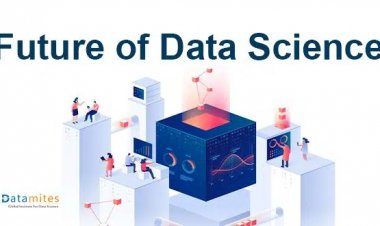How Much is the Data Science Course Fee in Canada?

Data science has emerged as a booming field in Canada, gaining immense popularity in recent years. With the increasing reliance on data-driven decision-making across industries, the demand for data scientists and analysts has skyrocketed.
According to a Nova One Advisor report, the data science platform market reached a valuation of USD 97.6 billion in 2022 and is projected to exceed USD 446.79 billion by 2032, demonstrating a compound annual growth rate (CAGR) of 16.43% during the forecast period spanning from 2023 to 2032.
Data science professionals in Canada are witnessing a plethora of opportunities. Industries such as finance, healthcare, e-commerce, and technology are actively seeking data experts to harness the power of data. This article explores the rising popularity and abundant opportunities in the field of data science within the Canadian job market.
Unlocking Insights from Data: The Essence of Data Science
Data science is a multidisciplinary field that blends scientific methods, algorithms, processes, and systems to extract meaningful insights and knowledge from structured and unstructured data. It encompasses various domains, including statistics, machine learning, data engineering, and domain expertise, to analyze vast datasets and uncover hidden patterns, trends, and valuable information.
According to a Fortune Business Insight report, the anticipated growth of the worldwide data science platform market is from $81.47 billion in 2022 to an estimated $484.17 billion by 2029, reflecting a substantial compound annual growth rate (CAGR) of 29.0% throughout the forecast period.
Data scientists utilize their expertise to develop predictive models, make data-driven decisions, and solve complex problems across industries such as healthcare, finance, marketing, and more.
Navigating the Data Landscape: Job Roles in Data Science
Data science job roles offer a diverse array of opportunities, each playing a vital part in the data-driven ecosystem. Some essential roles within this industry encompass:
- Data Analysts: These professionals focus on data cleaning, visualization, and exploratory analysis to extract insights from data.
- Data Scientists: Data scientists delve deeper, using statistical methods and machine learning algorithms to build predictive models and solve complex problems.
- Machine Learning Engineers: They design, implement, and deploy machine learning algorithms and models for various applications like recommendation systems and computer vision.
- Data Engineers: Data engineers ensure data is collected, stored, and processed efficiently, creating the foundation for analytics and machine learning.
- Business Intelligence Analysts: They transform data into actionable insights for strategic decision-making within organizations.
- Data Architects: Data architects design and manage data infrastructures, ensuring data is stored securely and can be accessed effectively.
- Big Data Engineers: These specialists handle massive datasets and use technologies like Hadoop and Spark for data processing.
- AI/ML Researchers: Researchers focus on advancing the field by developing new algorithms and techniques.
Refer these articles:
- Leveraging Data Science to Logistics Industry
- Data Science for the Manufacturing Sector
- How the Financial Sector is Leveraging Data Science
Unlocking Opportunities: Why Pursue a Data Science Career in Canada
As indicated in a report from the International Data Corporation (IDC), the global data volume is poised to surpass 175 zettabytes by the year 2025. Pursuing a data science career in Canada offers a multitude of compelling reasons:
- Thriving Tech Ecosystem: Canada boasts a rapidly growing tech industry, particularly in cities like Toronto, Vancouver, and Montreal. This creates a fertile ground for data science professionals, with numerous job opportunities in established companies and startups.
- Strong Education System: The country is home to world-renowned universities offering top-notch data science programs. These institutions not only provide quality education but also facilitate networking and career development.
- Diverse Industries: Data science skills are in demand across various sectors in Canada, from finance and healthcare to natural resources and retail. This diversity allows data scientists to explore a wide range of career paths.
- Global Talent Hub: Canada welcomes skilled immigrants and has various programs that make it attractive for international data science professionals seeking to build their careers in a welcoming and inclusive environment.
- Quality of Life: Canada consistently ranks high for quality of life, healthcare, and safety. It’s a desirable place to live, offering a balanced lifestyle for professionals.
- Innovation and Research: The Canadian government invests in innovation and research, creating opportunities for data scientists to work on cutting-edge projects and contribute to advancements in the field.
- Stability: Canada’s stable economy and political environment provide a secure foundation for long-term career growth.
Uncovering Earning Potential: Salary Trends for Data Scientists in Canada
Canada is an attractive destination for data scientists due to its growing tech industry and demand for data-driven insights across various sectors. Like any profession, data scientist salaries in Canada can vary based on factors such as location, experience, education, and industry.
The salary of a data scientist in Canada ranges from CAD 89,386 per year according to an Indeed report. The salary can vary significantly depending on factors such as experience, location, industry, and education. Here are several important factors to contemplate:
Location: Salary levels for data scientists in Canada can vary based on the city or province. Cities with a high cost of living, such as Toronto, Vancouver, and Montreal, often offer higher salaries than smaller cities or rural areas.
Experience: Experienced data scientists with several years of experience typically command higher salaries than entry-level professionals. As you gain more expertise and demonstrate your skills, your earning potential is likely to increase.
Industry: Your salary can also be influenced by the sector in which you are employed. Data scientists in industries such as finance, healthcare, and technology tend to earn higher salaries compared to those in other sectors.
Education: A master’s or Ph.D. in a related field, such as computer science, statistics, or machine learning, can lead to higher-paying opportunities. However, experience and skills are often just as important as formal education.
Skills: Specialized skills, such as expertise in machine learning, deep learning, natural language processing, or big data technologies, can lead to higher salaries. Employers value data scientists who can apply advanced techniques to solve complex problems.
Certifications: Obtaining relevant certifications, such as those in data science, machine learning, or data engineering, can enhance your earning potential and marketability to employers.
Demand: The demand for data scientists in Canada has been on the rise due to the increasing importance of data-driven decision-making across various industries. High demand can lead to competitive salaries.
Data scientists in Canada can discover attractive salary prospects in prominent urban centres, which encompass:
- The salary of a data scientist in Toronto ranges from CAD 1,05,325 per year according to a Glassdoor report.
- The salary of a data scientist in Mississauga ranges from CAD 88,634 per year according to an Indeed report.
Refer these articles:
- How Much is the Data Science Course Fee in South Africa?
- How Much is the Data Science Course Fee in Australia?
- How Much is the Data Science Course Fee in USA?
Exploring the Pricing of Data Science Courses in Canada
The pricing of data science courses in Canada varies widely depending on factors such as the institution, course duration, and delivery method. On average, the data science course fee in Canada generally ranges from CAD 2000 to CAD 5000. In Canada, Online and part-time courses tend to be more affordable, while full-time programs at prestigious universities may be at the higher end of the price range. Scholarships and financial aid options are often available to help offset costs for aspiring data scientists.
Selecting the Perfect Data Science Course in Canada: Key Considerations and Tips
Selecting the perfect data science course in Canada requires careful consideration of various factors to ensure that you receive the best education and maximize your career opportunities. Here are some crucial factors and suggestions to assist you in making a well-informed choice:
Define Your Goals:
Start by understanding your career goals. Do you want to become a data scientist, machine learning engineer, or data analyst, or pursue a related field? Knowing your objectives will help you choose the right program.
Accreditation and Reputation:
Look for courses offered by accredited data science institutions in Canada with a strong reputation in data science and related fields. Universities such as the University of Toronto, the University of British Columbia, and McGill University are known for their quality programs.
Program Curriculum:
Review the course curriculum in detail. Ensure it covers topics relevant to your career goals, including machine learning, data analysis, programming languages (Python, R), statistics, and data visualization.
Faculty Expertise:
Investigate the expertise and research interests of the faculty members. Educators possessing industry expertise and engaged in ongoing research can offer valuable insights and networking opportunities.
Practical Experience:
Look for programs that offer opportunities for hands-on experience through projects, internships, or co-op placements. In the realm of data science, hands-on experience holds significant importance.
Industry Connections:
Check if the program has partnerships with IT companies, tech hubs, or data science organizations. These connections can facilitate networking and job placement.
Internship Opportunities:
Seek programs that offer robust internship or co-op opportunities, allowing you to gain real-world experience and build valuable industry connections during your studies.
Hands-On Projects:
Prioritize courses that incorporate hands-on projects, as they provide practical experience and allow you to apply data science skills in real-world scenarios, enhancing your learning and employability.
Financial Considerations:
Compare tuition fees, scholarships, and financial aid options. Don’t forget to consider the cost of living in the city where you’ll study.
Career Guidance:
Look for programs with comprehensive career guidance services to help you navigate your data science career path, including resume building, interview preparation, and job placement support.
Read the following articles:
- How Much is the Data Science Course Fee in Nepal?
- How Much is the Data Science Course Fee in Indonesia?
- How Much is the Data Science Course Fee in Switzerland?
Why DataMites for the best Data Science Training in Canada?
DataMites is a highly respected training institute that provides an extensive data science course in Canada, spanning eight months with a total immersive learning duration of 700 hours. This comprehensive program covers essential areas such as data analytics, data engineering, artificial intelligence, machine learning, and deep learning. Notably, the DataMites course holds accreditation from IABAC, guaranteeing students a recognized certification upon successful completion.
The institute places a strong emphasis on industry relevance, ensuring that students acquire the most up-to-date skills and knowledge aligning effectively with their desired career paths. The Certified Data Science Course in Canada offered by DataMites presents an exceptional opportunity for individuals seeking in-depth and thorough learning in the data science field.
Several significant factors contribute to DataMites strong reputation for exceptional data science training in Canada:
- Course Curriculum: DataMites training programs encompass a wide array of subjects, including certifications like Certified Data Scientist, Data Science for Managers, and Data Science Associate. Furthermore, foundational courses like the Data Science Foundation are available to help establish a solid knowledge base.
- Instructors Expertise: It is crucial to research the qualifications and industry experience of DataMites instructors. Instructors with practical experience can offer invaluable insights and guidance.
- Hands-on Learning: DataMites places a strong emphasis on hands-on learning in Canada. This approach equips students with practical skills and real-world experience.
- Internship Opportunities: Prospective students can inquire about internship opportunities or partnerships with local companies. Practical experience is essential in the field of data science, and an institute that can facilitate internships can be a valuable asset.
- Online Training Mode: Interactive online data science training in Canada offers engaging learning experiences. During the 120-hour live online sessions, participants have the opportunity to actively engage with experienced instructors and fellow students in real-time.
- Certifications: DataMites offers top-notch Data Science training in Canada, ensuring comprehensive knowledge and practical skills. They also focus on preparing students for data science certification in Canada, significantly enhancing their career prospects.
Certified Data Scientist (CDS) Program
How much is the DataMites data science course fee in Canada?
DataMites is committed to offering affordable and high-quality education to aspiring data scientists, making it an exceptional choice for students. Its Certified Data Scientist Course fee in Canada is priced between CAD 1,188 to CAD 3,050, ensuring that top-tier Data Science education is accessible to a wide range of learners. This affordability makes it an appealing option for individuals who aspire to build a career in Data Science without incurring exorbitant expenses.
Wrap-up
Data Science is poised for substantial growth in Canada. With its burgeoning tech industry and data-driven enterprises, Canada offers a promising landscape for data professionals. The future scope includes increased demand for data scientists, analysts, and engineers across sectors such as healthcare, finance, and renewable energy, as organizations seek to harness data for innovation and competitiveness. As the nation continues to invest in AI and data-driven research, Data Science will play a pivotal role in shaping Canada’s digital economy and driving opportunities for skilled professionals.
Data Science vs Data Analytics
Data Science Tutorials








